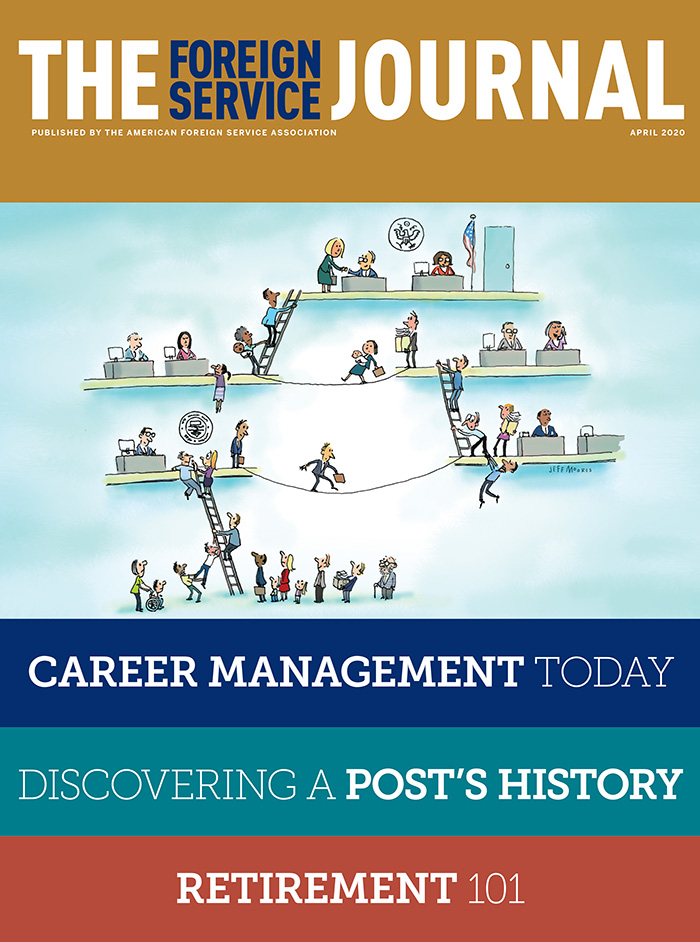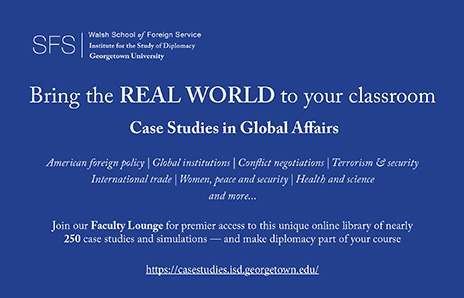Twenty-Five Year Apprenticeship: A Digital Forum
Letters-Plus
We recently learned about a unique project developed to support career growth for professional diplomats, “Twenty-Five Year Apprenticeship” (25yearapprenticeship.com). Compiled and curated by a group of FSOs and future FSOs, the online forum offers advice and guidance from leaders and mentors on how to become a successful diplomat. Following on the April Journal’s focus on managing an FS career, this Q&A with several of the founders of the site (who wish to remain anonymous) offers an inside look at what this group is trying to do for the profession.
—Shawn Dorman, Editor

What is the “Twenty-Five Year Apprenticeship”?
The project is a collective effort to offer both a practical manual for dynamic diplomacy and a forum for folks to ask for advice and mentorship, as well as a space to offer ideas and best practices. It is founded on the premise that all of us in the State Department could and should strive to develop our professional expertise throughout our career.
Since it’s all public, it’s also meant to be useful for aspiring diplomats or anyone else who may be interested in diplomatic tradecraft. We find that the advice from many of our diplomatic “legends” can be useful for any profession.
Why 25 years instead of, say, 10, 20 or 30?
It takes about 25 years for Foreign Service officers to “graduate” into the Senior Foreign Service, when they might serve for the first time as an ambassador, deputy chief of mission, office director or in any other top position of the profession.
How and why did you start this project?
A few of us reflected on the magnitude of the lessons we learned while supporting great leaders, especially those who aimed to accomplish extraordinary things and spur teams to achieve more than they believed possible to advance U.S. interests.
We want to share insights from these experiences with current and future colleagues who may not have had the opportunity to work directly for a “legend” of the Service.
We also noticed that many books written by and about diplomatic leaders fail to offer clues as to how these leaders arrived at the top of the profession. We were encouraged by Bill Burns’ recent book, The Back Channel, where he highlights the fact that there is no manual for diplomacy and notes that this is a shortfall.
Your tag line is “A path to diplomatic success.” That’s ambitious. Can you tell us more about this path, and how 25YA can help?
Ambition is an asset, in our minds—every diplomat should wake up with the ambition to advance U.S. interests, to shape the views of our interlocutors and chart a better future. We hope this project encourages everyone to strive to succeed and make an impact. We hope they find nuggets of inspiration that help them take a more ambitious approach to their job and career.
Who runs 25YA?
Currently, about 40 State Department employees and a dozen former career ambassadors participate in a continuous conversation to develop ideas and content for the site. We have also had more than 10 students from various universities and grad schools help with interviews, content and ideas. Thanks to their input, we have tried to offer advice and mentorship on what it takes to become an FSO.
We think it’s better that those of us who manage the site (conduct the interviews, curate and post the articles) remain anonymous. This is not about us. We aim to be “wiki-esque,” open to all to contribute and participate.
Fair enough. Can you share the names of some of the ambassadors who have contributed to the site so far?
Ambassador James Jeffrey gets credit for the site’s title, because he exhorts his charges to learn from him and treat each experience as part of a process of learning, or an “apprenticeship.”
Ambassadors Victoria Nuland and Richard Boucher have advised us throughout the process and provided suggestions, content and support.
Ambassadors Ronald Neumann, Alexander Vershbow and Deborah McCarthy have been extremely generous with their time and ideas.
And Ambassadors Nicholas Burns and Kristie Kenney recently contributed timely articles on leadership and crisis management.
How do the “legends” contribute?
The two most common ways they contribute are, first, through filling out the “Apprentice’s Questionnaire” that we modeled on Vanity Fair’s quick-response interview style, and that offers personal and professional insights; and, second, via interviews. We have interviewed more than 20 ambassadors, and each conversation has been fascinating—really, the best part of the project has been these exchanges.
What have you learned from speaking to these ambassadors?
In addition to incredible lessons and interesting stories, the two most important things we have learned are these: First, we have a dedicated community of impressive and inspiring former U.S. diplomats who are more than willing to support the next generation of State Department leaders, share their wisdom and offer mentorship. And, second, all of the contributing ambassadors encouraged us to keep learning.
Tell us about the letter of support from diplomatic leaders. How did you garner all that support?
We have been pleasantly surprised that everyone we have reached out to and spoken with has applauded our effort and encouraged us to develop the site further. More than 50 ambassadors have signed on to the letter of support, and most of them have offered content to the site, as well as advice and guidance. It seems that everyone agrees we need a diplomacy guide.
The letter suggests you also solicit input from military leaders, Capitol Hill and elsewhere. How do you decide who gets to be a “leader” contributor?
We would very much like to include input from across the federal government, including the Defense Department and Capitol Hill, and from think-tanks, about what it takes to advance U.S. interests and craft dynamic foreign policy. The State Department plays a leadership role in policy formulation, but we are not alone; so we hope we can offer insights into what it takes to succeed diplomatically from various perspectives.
We are committed to developing a site to pass on wisdom from the “legends” of diplomacy. We hope that many more current and former State employees and diplomatic practitioners will reach out to us to offer their ideas, expertise and advice, as well as help manage the site.
All the content on the site that does not have a byline was written by a current State Department employee, but we hope to offer more content from a diverse set of contributors. There are no fixed rules for who can contribute or what content makes sense; any content that offers practical tips, wisdom or insights into how to advance American diplomacy is welcome.
Do you have support from the State Department for this initiative?
The Director General’s office, the counselor’s office, the Foreign Service Institute, AFSA and others have all expressed support for our project. Anyone who checks out the site can see we are 100 percent nonpartisan and committed to supporting the State Department and our government.
What is your goal for the 25YA site?
Our goal is that the site becomes self-sustaining as more contributors pitch in to the project; eventually, we would love for someone(s) to build on the site content and publish a manual based on the lessons learned and tips we have started to elucidate. We hope that the project can help connect current employees with former ones for advice and mentorship.
Can you share some of the best advice that you’ve received working on this project?
There have been so many excellent insights that it’s hard to choose. A few that stand out: take time to enjoy the career, the experiences; keep learning; be humble; listen; excellence is worth striving for and can be achieved only by getting everyone on board; invest time in relationships, both with foreign counterparts and throughout the U.S. government; work outside the State Department, whether at another agency, the National Security Council or otherwise.
From what you have learned doing this project, what are the top five essential skills for successful diplomats?
I’d point you to the checklist published on the site that answers this question: www.25yearapprenticeship.com/become/what-it-takes-to-succeed-at-state.
What areas of growth do you see for this initiative in the near future?
We hope to continue to generate and develop content; find ways to encourage a more interactive site; and expand the mentoring component of the project, from 25YA participants to peers, from “legends” to current State folks, and from all of us to potential future State employees.
We hope the site can help educate the general population and inspire future State employees.
How can FSJ readers get involved and support the initiative?
Send the apprentices your ideas, your questions and your input. Let’s work together to lay out a path toward becoming the best experts, professionals, “journey-people” diplomats we can be. The project will be most successful when more people are contributing, so please write to us at 25yearapprentice@gmail.com, follow us on Twitter at @25yrapprentice, and join the conversation.


